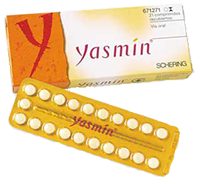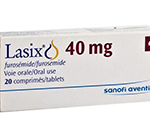
Yasmin

What is Yasmin?
Yasmin is a contraceptive pill and is used to prevent pregnancy. Each tablet contains a small amount of two female hormones, drospirenone and ethinylestradiol. Contraceptive pills that contain two hormones are called combination pills.
Mechanism of action
Yasmin prevents the maturation of the egg cell creating a situation similar to that of pregnancy (without an egg cell, neither fertilization nor pregnancy is possible). Moreover, the pill creates a thickening, at the entrance of the uterus, of the cervical mucus, so the spermatozoa in any case do not rise up to the fallopian tubes, where fertilization takes place.
Yasmin contains estrogen and a synthetic progestin: they are similar to natural ovarian hormones, estradiol and progesterone which, as a result of taking the pill, are “asleep”. The mechanism of action of contraceptives with predominantly progestin content arises from the combination of ovulation block with other effects.
Uses and dosage
Take one Yasmin tablet every day, if necessary with a little water. The pills can be taken on an empty stomach or after a meal, but you should take them at about the same time each day.
There are 21 pills in Yasmin blister. Days of the week are marked next to each pill. Start taking the pills from the slot with the corresponding week day marking: Mon for Monday, Tue for Tuesday, etc. Always take Yasmin pill at the same time of the day.
Do not take tablets for 7 days. During these 7 days (so-called week of suspension) menstruation must appear. This is called “suspension bleeding” and generally begins on the second or third day of the week of suspension.
On day 8, commence a new blister of Yasmin (ie after the 7-day break), regardless of whether or not menstruation ends. This means that every new Yasmin blister has to start on the same day of the week and menstruation will also start every month on the same day.
If you follow the instructions above, Yasmin contraceptive effect will be preserved even during the 7 days of suspension menstruation.
Yasmin directions

Yasmin pill must be taken every day at the same time and, even if there is a certain hourly tolerance, at least the band must be respected; example: if it is lunch time, the next day cannot be at dinner time nor the third day at breakfast time.
If during a regular intake one realizes that one has missed to take a pill, if more than twelve hours have passed since the time of the missed intake, it is possible to take the missed Yasmin dose and the contraceptive effect is guaranteed.
Yasmin vs Ocella
Ocella is a different brand name for the same medication; the drugs are mutually interchangeable.
Yasmin vs Marvelon
Like Yasmin, Marvelon is a combined contraceptive pill to be taken by mouth. Each tablet contains a small amount of two different female hormones. These are desogestrel (progestin) and ethinylestradiol (estrogen). In view of the low hormone content, Marvelon is considered a low dose oral contraceptive. Since all the tablets in the pack contain the same hormones in the same dose, Marvelon is considered a combined monophasic oral contraceptive.
Yasmin vs Lucette
Lucette has identical composition with Yasmin, which is drospirenone and ethinylestradiol used in the same proportions as in Yasmin: 0,03mg / 3mg. Lucette is manufactured by Consilient Health Ltd.
Yasmin vs Alesse
Alesse is a birth control pill based on levonorgestrel (progesterone) and ethinyl estrad (estrogen), which makes it a classical combination contraceptive pill with effects similar to those of Yasmin. Your prescriber might decide in favor of one drug over the other in case of individual intolerance to drugs’ composition or adverse event incidence.
Yasmin vs Levlen
Levlen is a contraceptive used orally. The birth control effect is achieved thanks to the two components, the hormones ethinylestradiol and levonorgestrel. Ethinylestradiol can be found in the composition of Yasmin. The choice between the two drugs should be carried out by a healthcare provider.
Yasmin vs Dianette

Dianette is a combination hormonal pill composed of cyproterone acetate and ethinylestradiol, thus having one of its ingredients in common with Yasmin. The use of Dianette is reserved for cases in which the treatment of androgen-dependent pathologies is necessary. Although due to its composition Diane also has a contraceptive effect, it should not be used for this purpose. Therefore after the complete resolution of the conditions for which the medicine has been prescribed it is recommended not to use further Dianette for contraceptive purposes only.
Side effects
- Mastalgia associated with increased breast size;
- Acne;
- Increased body weight;
- Headache and migraine;
- Nausea and vomiting;
- Mood swings;
- Changes in libido;
- Irregularity of the menstrual cycle, absent or light periods and intermenstrual blood loss (spotting);
- Abdominal cramps.
Precautions
The following risks should be considered when taking Yasmin:
- The risk of ovarian cyst formation. Ovarian cysts are not dangerous and tend to resolve spontaneously; however, in some women, they can be painful (pelvic pain);
- The risk of increased susceptibility to breast cancer and cervical cancer.
Contraindications
The following represent a contraindication to the use of the Yasmin:
- Simultaneous use of certain drugs, such as rifampicin and rifabutin antibiotics, carbamazepine antiepileptic drugs, oxcarbazepine, phenytoin and phenobarbital, hypericum and some antiretroviral medicines used to treat AIDS. These preparations reduce the effect of Yasmin.
- The presence of a cardiovascular disease;
- The presence of a liver disease;
- A past history of breast cancer and family predisposition to this tumor;
- A past history of continuous ovarian cysts.
Posted in Birth control
(1 voices, average: 5 of 5) 6776 views






















